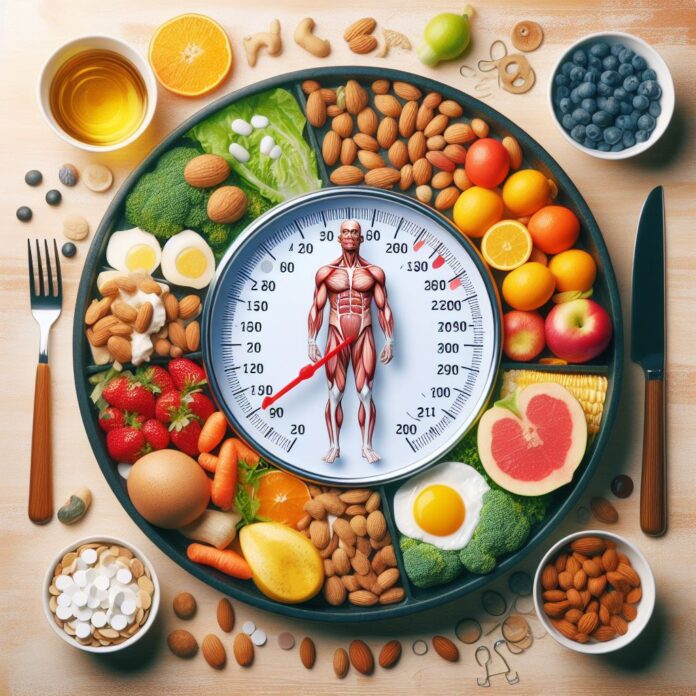In the complex interplay of health factors that define well-being, diet stands out as a critical element, particularly in its impact on hormonal health in men. Hormones, which serve as the body’s chemical messengers, govern a wide range of physiological processes from metabolism to mood regulation. Understanding the role of diet in hormonal balance is essential, as it can enhance everything from energy levels to mental clarity and physical health.
This article explores how various dietary components fats, proteins, carbohydrates, vitamins, minerals, and more affect male hormonal health, providing a roadmap for nutritional choices that support endocrine balance and overall wellness.
I. Role of Fats in Hormone Regulation:
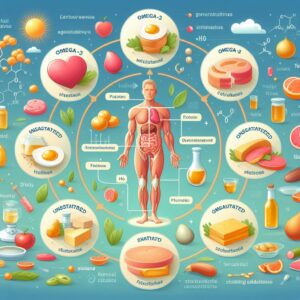
Fats play a pivotal role in maintaining hormonal health. We explore how different types of fats influence hormone regulation:
1. The Essentials of Healthy Fats:
Healthy fats, particularly unsaturated fats, are vital for the synthesis and regulation of hormones. These fats are found in foods like avocados, nuts, seeds, and fatty fish such as salmon and mackerel. They provide the necessary fatty acids, like omega-3 and omega-6, which are crucial components of cell membranes and are involved in the production of hormones like testosterone. By integrating these healthy fats into your diet, you support your body’s ability to maintain hormonal balance, fostering overall health and well-being.
2. The Impact of Saturated Fats:
While saturated fats are necessary in moderation, excessive intake can lead to negative hormonal impacts. Found in foods like red meat, butter, and cheese, saturated fats should be consumed judiciously. High levels of saturated fats can lead to an increase in LDL cholesterol and potentially disrupt the delicate balance of hormones in the body, affecting everything from testosterone levels to overall endocrine function.
3. The Risks of Trans Fats:
Trans fats are particularly harmful when it comes to hormonal health. Often present in processed foods, baked goods, and fast foods, trans fats can increase LDL cholesterol and lower HDL cholesterol, leading to inflammation and hormonal imbalances. Avoiding or minimizing the intake of trans fats is crucial for maintaining hormonal health and preventing long-term health issues.
4. Balancing Your Fat Intake:
Balancing your fat intake involves choosing more unsaturated fats and limiting saturated and trans fats. Incorporating sources of omega-3 fatty acids, such as flaxseeds, walnuts, and fatty fish, can particularly benefit hormonal health. These fats not only support hormone production but also reduce inflammation, which is linked to several hormonal disorders.
II. Importance of Proteins:
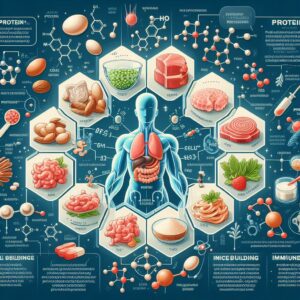
Proteins are more than just nutrients for muscle repair and growth; they are also integral to the production and regulation of hormones in the body:
1. Proteins as Hormonal Building Blocks:
Proteins are composed of amino acids, which are essential for synthesizing hormones. Hormones like insulin, growth hormone, and glucagon are peptides themselves, made directly from amino acids provided by dietary proteins. This makes protein intake crucial for ensuring the body has the necessary components to produce these vital hormones effectively.
2. Protein Sources and Their Hormonal Impacts:
A variety of protein sources are available, each contributing uniquely to hormonal health:
– Lean Meats: Chicken, turkey, and lean cuts of beef provide high-quality protein that supports muscle growth and hormone balance without the excess fat that can disrupt hormonal functions.
– Eggs: Packed with all essential amino acids, eggs are considered a ‘complete‘ protein and help in the maintenance of muscle mass and health, which in turn supports stable hormone levels.
– Plant-based Proteins: Lentils, chickpeas, and other legumes offer not only protein but also fiber, which helps in regulating blood sugar levels and, consequently, insulin a key hormone in metabolic processes.
3. Protein’s Role in Muscle Mass and Strength:
Protein is fundamental for building and maintaining muscle mass, which is intrinsically linked to hormonal health. Muscle tissue is metabolically active and helps regulate hormones by improving insulin sensitivity and increasing metabolic rate. This means that adequate protein intake is not only essential for muscle health but also for maintaining a balanced hormonal environment.
4. Optimizing Hormonal Health Through Protein Intake:
To optimize hormonal health, it’s important to consume adequate protein throughout the day to keep both muscle and hormone levels steady. This can be achieved by incorporating a variety of protein sources in meals and snacks, ensuring a constant supply of essential amino acids for hormone production and muscle maintenance.
III. Carbohydrates and Hormonal Fluctuations:

Carbohydrates play a significant role in influencing hormonal health, particularly through their effects on insulin production and blood sugar levels. Understanding how different types of carbohydrates can either support or hinder hormonal balance is crucial for maintaining optimal health.
1. Understanding the Role of Insulin:
Insulin is a hormone produced by the pancreas that helps regulate blood sugar levels by facilitating the uptake of glucose into cells. The type and amount of carbohydrates consumed directly affect how much insulin is released. Stable insulin levels are essential for preventing hormonal imbalances and related health issues.
2. Benefits of Low-Glycemic Carbohydrates:
Low-glycemic carbohydrates, such as those found in whole grains, legumes, and most vegetables, are digested more slowly, leading to a gradual release of glucose into the bloodstream. This slow release helps maintain steady blood sugar levels and prevents the sharp spikes in insulin that can disrupt hormonal balance. Incorporating these carbohydrates into your diet can support overall endocrine health by:
– Reducing the risk of insulin resistance, a condition that can lead to diabetes and other hormonal disorders.
– Enhancing satiety and thus aiding in weight management, which is closely linked to hormonal health.
3. Risks Associated with High-Glycemic Carbohydrates:
Conversely, high-glycemic carbohydrates, such as sugary snacks, white bread, and other refined foods, cause rapid spikes in blood sugar and insulin levels. These spikes can lead to:
– Short-term effects like energy crashes and increased hunger.
– Long-term issues including insulin resistance, which can disrupt hormonal balance and increase the risk of diabetes, obesity, and other metabolic syndromes.
4. Strategic Carbohydrate Consumption for Hormonal Health:
To optimize hormonal health through diet, it is advisable to:
– Prioritize the consumption of low-glycemic carbohydrates to help maintain stable insulin and blood sugar levels.
– Limit high-glycemic foods to avoid disruptive insulin spikes.
– Combine carbohydrates with proteins or healthy fats to further slow digestion and stabilize blood sugar levels.
IV. Vitamins and Minerals:
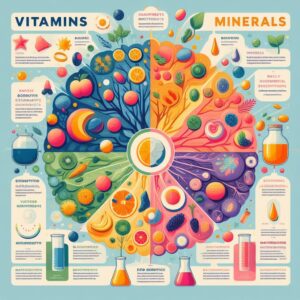
Vitamins and minerals play a fundamental role in maintaining hormonal balance and overall health. We explore the specific nutrients crucial for hormone regulation, focusing on how they influence processes such as testosterone production and hormonal stability in men:
1. Vitamin D: The Sunshine Vitamin for Testosterone.
Vitamin D is often referred to as the “sunshine vitamin” because the body produces it in response to sun exposure. It is also available through certain foods and supplements. Vitamin D plays a pivotal role in numerous bodily functions, including the regulation of testosterone levels. Studies have shown that adequate levels of Vitamin D are associated with higher levels of testosterone, which is essential for muscle growth, bone health, and overall vitality.
2. Zinc: A Key Mineral for Testosterone Management.
Zinc is a vital mineral that is crucial for many biological functions, including immune system performance and enzyme reactions. Importantly, zinc has a direct effect on the male hormonal system, particularly in the production and regulation of testosterone. Foods rich in zinc, such as oysters, beef, spinach, and pumpkin seeds, can help maintain adequate testosterone levels, supporting reproductive health and muscle growth.
3. Magnesium: Supporting Hormonal Activity:
Magnesium is another essential mineral that supports hundreds of biochemical reactions in the body, including those related to hormone regulation. Magnesium helps in the production of testosterone by improving the antioxidant capacity of the body and reducing oxidative stress, which can negatively impact hormone production. Foods like almonds, black beans, and whole grains are excellent sources of magnesium.
4. Selenium: Critical for Thyroid Hormone Synthesis.
Selenium is crucial for the health of the thyroid gland, which regulates metabolism and other hormonal functions. Selenium assists in the conversion of thyroid hormones from their inactive to active forms. Brazil nuts, seafood, and eggs are good dietary sources of selenium, making them beneficial for maintaining thyroid health and hormonal balance.
5. Integrating These Nutrients into Your Diet:
To ensure optimal hormonal health, it’s important to integrate these vitamins and minerals into your diet:
– Spend time outdoors to naturally boost Vitamin D levels.
– Include a variety of zinc and magnesium-rich foods to support testosterone and overall hormone function.
– Consider selenium-rich foods for thyroid health, especially if you have a higher risk of thyroid disorders.
V. Influence of Fiber on Hormone Excretion:
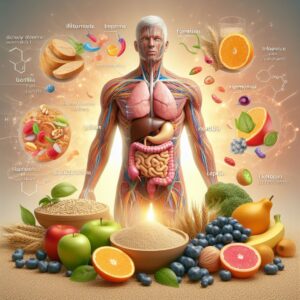
Dietary fiber is renowned not only for its benefits to digestion and heart health but also for its significant role in hormone excretion. How fiber influences hormonal health by aiding in the proper elimination of hormones from the body, thus preventing hormonal imbalances:
1. How Fiber Affects Hormone Levels:
Dietary fiber, especially soluble fiber, binds to various substances in the gut, including hormones like estrogen and testosterone. This binding helps prevent the reabsorption of these hormones back into the bloodstream through the intestinal walls. Instead, fiber helps carry these hormones out of the body through fecal matter. This process is crucial in maintaining hormonal balance, particularly in preventing conditions related to hormone excess, such as estrogen dominance.
2. Sources of Dietary Fiber:
Incorporating a variety of high-fiber foods is essential for optimizing hormone health. Some of the best sources include:
– Oats and Whole Grains: These not only provide soluble fiber but also contain nutrients that support overall health.
– Legumes: Beans, lentils, and chickpeas are high in fiber, which aids in hormone regulation and also provides a feeling of fullness which can aid in weight management.
– Fruits and Vegetables: These natural sources of fiber also offer antioxidants and other nutrients that support hormonal and general health.
3. Fiber’s Role in Detoxification:
Fiber enhances the body’s detoxification processes by absorbing and then removing toxins and excess hormones. This is particularly important for the liver, which plays a significant role in hormone regulation. By supporting regular bowel movements, fiber helps ensure that the liver’s efforts to process and eliminate hormones are not in vain, as these hormones are less likely to be reabsorbed.
4. Recommended Daily Fiber Intake:
The recommended daily intake of fiber is about 25 grams for women and 38 grams for men. Achieving this may require conscious dietary choices, such as choosing whole-grain products over refined ones, and incorporating a variety of fruits and vegetables into every meal.
VI . Role of Fatty Acids in Inflammation and Hormone Production:

Omega-3 fatty acids are renowned for their health benefits, particularly in reducing inflammation and supporting hormonal health. We delve into the significant impact these fatty acids have on reducing chronic inflammation and enhancing hormone production, crucial for overall well-being.
1. Understanding Omega-3 Fatty Acids:
Omega-3 fatty acids are a type of essential fat that the body cannot produce on its own; they must be obtained through diet. These fats are primarily found in fatty fish like salmon, mackerel, and sardines, as well as in flaxseeds, chia seeds, and walnuts. Omega-3s are crucial for building healthy cell membranes and playing a key role in anti-inflammatory processes that support hormone production and regulation.
2. Omega-3s and Inflammation:
Chronic inflammation can disrupt hormonal balance and lead to various health issues, including cardiovascular diseases, arthritis, and metabolic syndrome. Omega-3 fatty acids counteract this by reducing the production of substances linked to inflammation, such as inflammatory eicosanoids and cytokines. By modulating the inflammatory response, omega-3s help maintain a healthy hormonal environment, facilitating optimal production and function of hormones like testosterone.
3. Impact on Hormone Production:
The anti-inflammatory properties of omega-3 fatty acids are particularly beneficial for hormone production. For example, they help regulate the synthesis of hormone-like substances called eicosanoids, which play a role in inflammatory processes. Reducing inflammation through a diet rich in omega-3s can prevent the disruption of hormone production and support overall endocrine health.
4. Dietary Sources and Recommendations:
To gain the benefits of omega-3 fatty acids, incorporating the following foods into your diet is recommended:
– Fatty Fish: Aim to consume fatty fish such as salmon, mackerel, or sardines 2-3 times per week.
– Plant Sources: For vegetarians or those who prefer not to eat fish, flaxseeds, chia seeds, and walnuts are excellent sources of ALA, a type of omega-3 that the body partially converts to the active forms used in inflammation and hormone regulation.
– Supplements: If dietary sources are insufficient, omega-3 supplements like fish oil or algae oil can be an effective alternative.
VII. Dietary Patterns and Overall Hormonal Health:
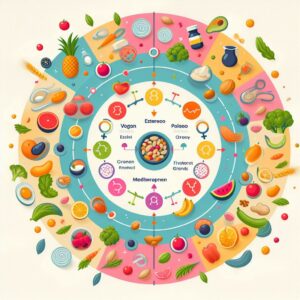
Dietary patterns play a pivotal role in maintaining hormonal balance, which is essential for overall health and well-being. The Mediterranean diet, known for its rich array of nutrients, offers a prime example of how certain diets can support hormonal health, whereas others like high-processed food diets can lead to imbalances.
1. The Benefits of the Mediterranean Diet:
The Mediterranean diet is celebrated for its numerous health benefits, particularly in promoting hormonal balance. This diet pattern emphasizes:
– Fruits and Vegetables: Rich in vitamins, minerals, and antioxidants, these foods reduce oxidative stress, which can damage cells and disrupt hormone functions.
– Nuts and Seeds: These are excellent sources of healthy fats and proteins, which are essential for hormone production and regulation.
– Whole Grains: Complex carbohydrates in whole grains help maintain consistent blood sugar levels, thus supporting steady insulin levels and overall hormonal balance.
– Fish and Olive Oil: High in omega-3 fatty acids, these foods combat inflammation, which can adversely affect hormone production and regulation.
Adopting this diet not only supports the optimal production of hormones such as testosterone and estrogen but also enhances the body’s natural detoxification processes, further aiding in hormonal health.
2. Risks of High-Processed and Sugary Diets:
In contrast, diets high in processed foods and sugars pose significant risks to hormonal health. These foods often lead to:
– Increased Inflammation: Processed foods can trigger inflammatory responses, disrupting hormonal activity and balance.
– Insulin Resistance: High intake of refined sugars and processed carbohydrates can lead to spikes in insulin levels, eventually causing insulin resistance, a key factor in hormonal imbalance and metabolic disorders.
– Decreased Testosterone Levels: Diets high in unhealthy fats and sugars have been linked to lower testosterone levels, which can affect muscle strength, mood, and overall energy levels.
3. Practical Tips for Adopting Healthier Dietary Patterns:
– Incorporate Variety: Ensure your diet includes a diverse range of whole foods to get a broad spectrum of nutrients necessary for hormonal balance.
– Cook at Home: Preparing meals at home can help control ingredients and avoid excessive sugars and unhealthy fats found in many processed foods.
– Mindful Eating: Pay attention to not only what you eat but how you eat, focusing on enjoying your meals slowly and mindfully to improve digestion and satiety, which helps regulate hormonal cues.
VIII. Recommendations for Optimizing Hormonal Health Through Diet:

Here are key strategies to optimize your hormonal health through dietary and lifestyle choices:
1. Consistent Nutrient Intake:
Ensure each meal contains a good mix of fats, proteins, and carbohydrates to support hormone balance. This not only aids in maintaining stable blood sugar levels but also supports continuous hormone production and regulation.
2. Regular Meal Timing:
Regular meal timing can help maintain consistent blood sugar levels, which is crucial for normal insulin function and overall hormonal balance. Avoid long periods without food to prevent spikes and dips in blood sugar that can lead to hormonal disruptions.
3. Diverse Dietary Sources:
Each type of food provides unique nutrients that can aid in hormonal health. Diverse sources of fats, proteins, and carbohydrates ensure a broader spectrum of essential nutrients. This includes fatty fish for omega-3 fatty acids, lean meats and legumes for protein, and whole grains and vegetables for complex carbohydrates.
4. Mindful of Anti-Inflammatory Foods:
Chronic inflammation can severely disrupt hormonal activity. Including anti-inflammatory foods like turmeric, green leafy vegetables, nuts, and seeds can help reduce inflammation levels and support hormone health.
5. Limit Processed Foods and Sugars:
These can lead to insulin resistance and hormonal imbalances. Opting for whole foods over processed ones can significantly improve your hormonal balance.
6. Adequate Fiber Intake:
Fiber helps regulate the excretion of hormones through the digestive tract and supports a healthy gut microbiome, which is essential for overall hormonal health.
7. Regular Physical Activity:
Regular exercise can help maintain a healthy weight and reduce insulin resistance, both of which are vital for hormonal balance. Exercise also boosts mood and energy levels, further supporting hormonal health.
8. Hydration:
Adequate water intake is crucial for all bodily functions, including hormone production and detoxification processes.
9. Monitoring Hormone Levels:
Periodic health check-ups can help monitor hormone levels and assess how well your dietary habits are supporting your hormonal health. Adjustments can be made based on these findings.
10. Stress Management:
High-stress levels can alter hormone levels and disrupt their natural balance. Techniques such as mindfulness, meditation, and adequate sleep can help manage stress effectively.
Conclusion:
Navigating the complexities of diet and its impact on hormonal health can seem daunting, but it offers a powerful means to enhance well-being. By emphasizing nutrient-dense foods, balancing macronutrients, and avoiding dietary pitfalls like processed foods and excessive sugars, men can significantly influence their hormonal health. The insights provided here serve not just to educate but to empower individuals to make dietary choices that foster hormonal balance, supporting a healthier, more vibrant life. Regular monitoring and adjustments based on personal health needs can further optimize outcomes, making diet a cornerstone of hormonal health management.

